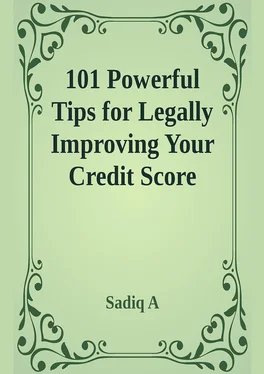Sadiq A - 101 Powerful Tips For Legally Improving Your Credit Score
Здесь есть возможность читать онлайн «Sadiq A - 101 Powerful Tips For Legally Improving Your Credit Score» — ознакомительный отрывок электронной книги совершенно бесплатно, а после прочтения отрывка купить полную версию. В некоторых случаях можно слушать аудио, скачать через торрент в формате fb2 и присутствует краткое содержание. Жанр: unrecognised, на английском языке. Описание произведения, (предисловие) а так же отзывы посетителей доступны на портале библиотеки ЛибКат.
- Название:101 Powerful Tips For Legally Improving Your Credit Score
- Автор:
- Жанр:
- Год:неизвестен
- ISBN:нет данных
- Рейтинг книги:4 / 5. Голосов: 1
-
Избранное:Добавить в избранное
- Отзывы:
-
Ваша оценка:
- 80
- 1
- 2
- 3
- 4
- 5
101 Powerful Tips For Legally Improving Your Credit Score: краткое содержание, описание и аннотация
Предлагаем к чтению аннотацию, описание, краткое содержание или предисловие (зависит от того, что написал сам автор книги «101 Powerful Tips For Legally Improving Your Credit Score»). Если вы не нашли необходимую информацию о книге — напишите в комментариях, мы постараемся отыскать её.
101 Powerful Tips For Legally Improving Your Credit Score — читать онлайн ознакомительный отрывок
Ниже представлен текст книги, разбитый по страницам. Система сохранения места последней прочитанной страницы, позволяет с удобством читать онлайн бесплатно книгу «101 Powerful Tips For Legally Improving Your Credit Score», без необходимости каждый раз заново искать на чём Вы остановились. Поставьте закладку, и сможете в любой момент перейти на страницу, на которой закончили чтение.
Интервал:
Закладка:
101 Powerful Tips forLegally Improving Your Credit Score
BY
Sadiq A
© Copyright 2020 Sadiq A - All rights reserved.
LEGAL NOTICE
The Publisher has strived to be as accurate and complete as possible in the creation of this report, notwithstanding the fact that he does not warrant or represent at any time that the contents within are accurate due to the rapidly changing nature of the Internet.
While all attempts have been made to verify information provided in this publication, the Publisher assumes no responsibility for errors, omissions, or contrary interpretation of the subject matter herein. Any perceived slights of specific persons, peoples, or organizations are unintentional.
In practical advice books, like anything else in life, there are no guarantees of income made. Readers are cautioned to reply on their own judgment about their individual circumstances to act accordingly.
This book is not intended for use as a source of legal, business, accounting or financial advice. All readers are advised to seek services of competent professionals in legal, business, accounting and finance fields.
You are encouraged to print this book for easy reading.
Table of Contents
Introduction
The Basics
The Best Ways to Boost Your Credit Score
Keep Your Credit Score Safe
Avoid Common Credit Score Mistakes
Dealing With Your Credit Report to Deal With Your Credit Score
Dealing With a Credit Score after a Big Problem
Dealing With Professional Credit Help
General Good Financial Habits Build Good Credit Scores
Think Like a Lender
Develop an Organized Strategy to Repair Your Credit Score
Loans and Your Credit Score
Make Credit Repair Easier on Yourself
Student Credit Repair
Dealing with Debt
Credit Repair and Your Emotions
Parting Credit Tips
Conclusion
Recommended Resources
Introduction
There are many misconceptions about credit scores out there. There are customers who believe that they don’t have a credit score and many customers who think that their credit scores just don’t really matter. These sorts of misconceptions can hurt your chances at some jobs, at good interest rates, and even your chances of getting some apartments.
The truth is, of you have a bank account and bills, then you have a credit score, and your credit score matters more than you might think. Your credit score may be called many things, including a credit risk rating, a FICO score, a credit rating, a FICO rating, or a credit risk score. All these terms refer to the same thing: the three-digit number that lets lenders get an idea of how likely you are to repay your bills.
Every time you apply for credit, apply for a job that requires you to handle money, or even apply for some more exclusive types of apartment living, your credit score is checked.
In fact, your credit score can be checked by anyone with a legitimate business need to do so. Your credit score is based on your past financial responsibilities and past payments and credit, and it provides potential lenders with a quick snapshot of your current financial state and past repayment habits.
In other words, your credit score lets lenders know quickly how much of a credit risk you are. Based on this credit score, lenders decide whether to trust you financially - and give you better rates when you apply for a loan. Apartment managers can use your credit score to decide whether you can be trusted to pay your rent on time. Employers can use your credit score to decide whether you can be trusted in a high-responsibility job that requires you to handle money.
The problem with credit scores is that there is quite a bit of misinformation circulated about, especially through some less than scrupulous companies who claim they can help you with your credit report and credit score - for a cost, of course.
From advertisements and suspect claims, customers sometimes come away with the idea that in order to boost their credit score, they have to pay money to a company or leave credit repair in the hands of so-called “experts.” Nothing could be further from the truth. It is perfectly possible to pay down debts and boost your credit on your own, with no expensive help whatsoever.
In fact, the following 101 tips can get you well on your way to boosting your credit score and saving you money.
By the end of this ebook, you will be able to:
• Define a credit score, a credit report, and other key financial terms
• Develop a personalized credit repair plan that addresses your unique financial situation
• Find the resources and people who can help you repair your credit score
• Repair your credit effectively using the very techniques used by credit repair experts
Plus, unlike many other books on the subject, this ebook will show you how to deal with your everyday life while repairing your credit. Your credit repair does not happen in a vacuum.
This book will teach you the powerful strategies you need to build the financial habits that will help you to a keep a high credit risk rating. It really is that simple.
Start reading and be prepared to start taking small but powerful steps that can have a dramatic impact on your financial life!
The Basics
Before you start boosting your credit score, you need to know the basics. You need to know what a credit score is, how it is developed, and why it is important to you in your everyday life.
Lenders certainly know what sort of information they can get from a credit score, but knowing this information yourself can help you better see how your everyday financial decisions impact the financial picture lenders get of you through your credit score. A few simple tips are all you need to know to understand the basic principles:
Tip #1: Understand where credit scores come from.
If you are going to improve your credit score, then logic has it that you must understand what your credit score is and how it works. Without this information, you won’t be able to very effectively improve your score because you won’t understand how the things you do in daily life affect your score.
If you don’t understand how your credit score works, you will also be at the mercy of any company that tries to tell you how you can improve your score - on their terms and at their price.
In general, your credit score is a number that lets lenders know how much of a credit risk you are. The credit score is a number, usually between 300 and 850, that lets lenders know how well you are paying off your debts and how much of a credit risk you are.
In general, the higher your credit score, the better credit risk you make and the more likely you
are to be given credit at great rates. Scores in the low 600s and below will often give you trouble in finding credit, while scores of 720 and above will generally give you the best interest rates out there. However, credit scores are a lot like GPAs or SAT scores from college days - while they give others a quick snapshot of how you are doing, they are interpreted by people in different ways. Some lenders put more emphasis on credit scores than others.
Some lenders will work with you if you have credit scores in the 600s, while others offer their best rates only to those creditors with very high scores indeed. Some lenders will look at your entire credit report while others will accept or reject your loan application based solely on your credit score.
The credit score is based on your credit report, which contains a history of your past debts and repayments. Credit bureaus use computers and mathematical calculations to arrive at a credit score from the information contained in your credit report.
Читать дальшеИнтервал:
Закладка:
Похожие книги на «101 Powerful Tips For Legally Improving Your Credit Score»
Представляем Вашему вниманию похожие книги на «101 Powerful Tips For Legally Improving Your Credit Score» списком для выбора. Мы отобрали схожую по названию и смыслу литературу в надежде предоставить читателям больше вариантов отыскать новые, интересные, ещё непрочитанные произведения.
Обсуждение, отзывы о книге «101 Powerful Tips For Legally Improving Your Credit Score» и просто собственные мнения читателей. Оставьте ваши комментарии, напишите, что Вы думаете о произведении, его смысле или главных героях. Укажите что конкретно понравилось, а что нет, и почему Вы так считаете.












